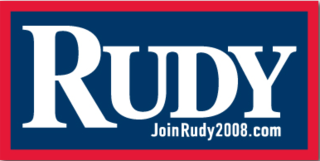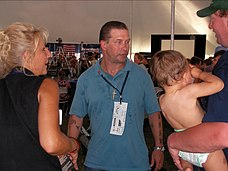
This article contains lists of official candidates associated with the 2008 Republican Party presidential primaries for the 2008 United States presidential election.
The following is a timeline of major events leading up to and immediately following the United States presidential election of 2008. The election was the 56th quadrennial United States presidential election. It was held on November 4, 2008, but its significant events and background date back to about 2002. The Democratic Party nominee, Senator Barack Obama of Illinois, defeated the Republican Party's nominee, Senator John McCain of Arizona.

The 2008 Iowa Republican presidential caucuses took place on January 3, 2008. The Iowa Republican caucuses are an unofficial primary, with the delegates to the state convention selected proportionally via a straw poll. The Iowa caucuses mark the traditional formal start of the delegate selection process for the 2008 United States presidential election.

From January 3 to June 3, 2008, voters of the Republican Party chose their nominee for president in the 2008 United States presidential election. Senator John McCain of Arizona was selected as the nominee through a series of primary elections and caucuses culminating in the 2008 Republican National Convention held from Monday, September 1, through Thursday, September 4, 2008, in Saint Paul, Minnesota. President George W. Bush was ineligible to be elected to a third term due to the term limits established by the 22nd Amendment.

The Mitt Romney presidential campaign of 2008 began on January 3, 2007, two days before Mitt Romney left office as governor of Massachusetts, when he filed to form an exploratory committee with the Federal Election Commission to run for President of the United States as a Republican in the 2008 election. Subsequently, on February 13, 2007, he formally announced his candidacy for the Republican nomination for president in 2008. He did so at the Henry Ford Museum and Greenfield Village in Dearborn, Michigan, as an emblem of American ingenuity.

The 2008 presidential campaign of Rudy Giuliani began following the formation of the Draft Giuliani movement in October 2005. The next year, Giuliani opened an exploratory committee and formally announced in February 2007 that he was actively seeking the presidential nomination of the Republican Party.

The 2008 presidential campaign of John McCain, the longtime senior U.S. Senator from Arizona, was launched with an informal announcement on February 28, 2007, during a live taping of the Late Show with David Letterman, and formally launched at an event on April 25, 2007. His second candidacy for the Presidency of the United States, he had previously run for his party's nomination in the 2000 primaries and was considered as a potential running mate for his party's nominee, then-Governor George W. Bush of Texas. After winning a majority of delegates in the Republican primaries of 2008, on August 29, leading up to the convention, McCain selected Governor Sarah Palin of Alaska as his running mate for Vice President. Five days later, at the 2008 Republican National Convention, McCain was formally selected as the Republican Party presidential nominee in the 2008 presidential election.
In early 2007, Ron Paul, a congressman from Texas, announced his candidacy for the Republican Party's nomination for president of the United States in the 2008 election. Initial opinion polls during the first three quarters of 2007 showed him consistently receiving support from 3% or less of those polled. In 2008, Paul's support among Republican voters remained in the single digits, and well behind front-runner John McCain.

The Tommy Thompson presidential campaign of 2008 began when the former Wisconsin Governor and Secretary of Health and Human Services Tommy Thompson announced his candidacy for the Republican Party nomination for President of the United States on April 1, 2007. Thompson centered his campaign in Iowa, where he had spent the previous year building an organization in anticipation of the Ames straw poll. Throughout the campaign, Thompson remained low in Republican opinion polls and garnered very few political endorsements and campaign donations. He dropped out of the race on August 12, 2007 following a sixth-place finish at Ames.
The first political debate before the 2008 Republican primaries was held on May 3, 2007, at the Ronald Reagan Presidential Library in California. Other debates have taken place in New Hampshire, South Carolina, and Florida. They were generally broadcast by television networks.

The Mike Huckabee 2008 presidential campaign began on January 28, 2007, when former Governor of Arkansas Mike Huckabee announced his candidacy for the Republican nomination for President of the United States for the 2008 election. Huckabee ultimately ended his bid for the nomination after losing the Texas Republican primary on March 4, 2008.
Duncan L. Hunter's 2008 presidential campaign began when fourteen-term Congressman and Vietnam War veteran Duncan L. Hunter of California announced his intentions to run for the 2008 Republican nomination for President of the United States in January 2007.
The 2008 presidential campaign of Tom Tancredo, a Congressman from Colorado began on April 2, 2007 with a formal announcement. The campaign garnered grassroots support and endorsements from conservative Republicans concerned about illegal immigration and border security. However, Tancredo remained low in the polls and was criticized for his nativist campaign, which had been described as "single-issued." Tancredo stated that he probably would not win the nomination but hoped his campaign would bring forth more debate on his issue of concern, immigration. On December 20, 2007 Tancredo withdrew from the presidential race, and endorsed Mitt Romney.

The 2008 United States presidential election in Iowa took place on November 4, 2008, as part of the 2008 United States presidential election. Voters chose seven representatives, or electors to the Electoral College, who voted for president and vice president.

The 2008 Michigan Republican presidential primary took place on January 15, 2008. Mitt Romney came in first with 39 percent of the vote, followed by John McCain with 30 percent and Mike Huckabee in third-place with 16 percent. The victory was widely viewed as critical for the Romney campaign, as a loss in Michigan, where his father was governor, would have resulted in a loss of momentum after two losses already in New Hampshire and Iowa.
The 2008 presidential campaign of Jim Gilmore, 68th Governor of Virginia and Chairman of the Republican National Committee began after being drafted to run by his peers in January 2007. He officially began the campaign in April after filing papers with the Federal Election Commission. Gilmore was committed to conservative principles throughout his run, which ultimately ended in July 2007 due to a lack of sufficient funding. The campaign led to Gilmore's decision to run in the 2008 Virginia Senatorial race, which he lost to Democrat Mark Warner.
The following is a timeline of major events leading up to the United States presidential election of 2012. The election was the 57th quadrennial United States presidential election held on November 6, 2012.

This article contains lists of notable candidates for the United States Republican Party's 2012 presidential nomination.
This article contains the list of candidates associated with the 2016 Republican Party presidential primaries for the 2016 United States presidential election.

The 2016 presidential campaign of Mike Huckabee, the 44th Governor of Arkansas, began on May 5, 2015, at an event in his hometown of Hope, Arkansas. Huckabee's candidacy for the Republican nomination in the 2016 presidential election was his second, after having previously run in 2008. Following a disappointing showing in the Iowa caucuses, Huckabee ended his run on February 1, 2016.
















